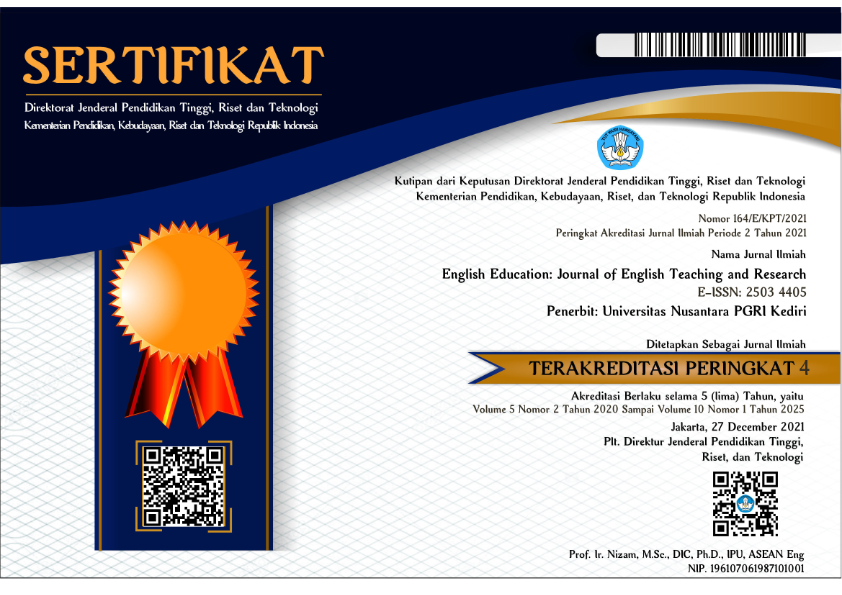Pre-Service Teachers’ Attitude toward Internet Use in Learning and Their Academic Achievement
DOI:
https://doi.org/10.29407/jetar.v6i1.15849Keywords:
academic, achievement, attitude, internetAbstract
The internet has helped us spreading knowledge in a very swift manner and to make its accessibility available for almost everyone. It can offer the possibility to help learners, with the right attitude, to achieve better in their respective fields. This study tries to investigate the attitude of pre-service teachers in an English Education Study Program in South Sumatra toward internet use in their teaching and learning process; and to check its relationship with their academic achievement. All active students, 157 in total, in an English Education Study Program in South Sumatra, Indonesia were taken in as the subjects of the study. The data were collected using Attitude toward Internet Use in Language Learning Questionnaire and students’ cumulative GPA. The results revealed that most of the pre-service teachers showed a moderate level of positive attitude toward internet use (77.71%, 21.02% for high level, 1.27% for low level) with affective aspect as the dominant factors for the attitude (followed by behavior and cognitive aspects respectively). Furthermore, the results of the Pearson correlation indicated that there was a significant fair positive association between pre-service teachers’ attitude toward internet use in learning and academic achievement, (r(157) = .443, p = .001). This study also provided some implications and recommendations for further research.
Downloads
References
REFERENCES
Abdullah, Z. D., Ziden, A. B. A., Aman, R. B. C., & Mustafa, K. I. (2015). Students ’ Attitudes towards Information Technology and the Relationship with their Academic Achievement. Contemporary Education Technology, 6(4), 338–354.
Acut, D. P., Carpo, M. J. C., Caparoso, J. K. V., Magsayo, J. R., & Sombilon, V. A. (2016). Relationship of Students’ Internet Usage and Academic Performance. The 4th International Conference of Science Educators and Teachers, 2–9.
Bertolini, K., Stremmel, A., & Thorngren, J. (2012). Student Achievement Factors. http://files.eric.ed.gov/fulltext/ED568687.pdf
Creswell, J. W. (2012). Educational research: Planning, conducting, and evaluating quantitative and qualitative research (4th ed.). Pearson Education, Inc.
D’Esposito, J. E., & Gardner, R. M. (1999). University Students’ Perceptions of the Internet: An Exploratory Study. Journal of Academic Librarianship, 25(6), 456–461.
Dogruer, N., Eyyam, R., & Menevis, I. (2011). The use of the internet for educational purposes. Procedia - Social and Behavioral Sciences, 28, 606–611. https://doi.org/10.1016/j.sbspro.2011.11.115
Eret, E., Gokmenoglu, T., & Demir, C. (2013). A Review of Research on Educational Theories and Approaches Affecting A Review of Research on Educational Theories and Approaches Affecting Students Achievement : 1990-2011. Elementary Education Online, 12(3), 687–700.
Ezemenaka, K. E. (2013). The usage and impact of Internet enabled phones on academic concentration among students of tertiary institutions : A study at the The usage and impact of Internet enabled phones on academic concentration among students of tertiary institutions : A study. The International Journal of Education and Development Using Information and Communication Technology, 9(3), 162–173.
Heimerl, K., Ali, K., Menon, A., Brewer, E., Hasan, S., & Parikh, T. (2015). Analysis of Smartphone Adoption and Usage in a Rural Community Cellular Network. The Seventh International Conference on Information and Communication Technologies and Development - ICTD, 1–4. https://doi.org/10.1145/2737856.2737880
Howe, W. (2016). A Brief History of the Internet: An anecdotal history of the people and communities that brought about the Internet and the Web. Internet Article.
Jagboro, K. (2003). A study of Internet usage in Nigerian universities: A case study of Obafemi Awolowo University, Ile-Ife, Nigeria. First Monday, 8(2). https://doi.org/10.5210/fm.v8i2.1033
Javad, K. H., & Leila, A. A. (2015). Attitudes toward using the Internet for language learning : A case of Iranian English teachers and learners. International Journal of Research Studies in Educational Technology, 4(1), 63–78. https://doi.org/10.5861/ijrset.2015.1029
Kemdikbud. (2017). Panduan Implementasi Keterampilan Abad 21 Kurikulum 2013 di SMA. Kementerian Pendidikan dan Kebudayaan.
Kementrian Komunikasi dan Informasi. (2014). Riset Kominfo dan UNICEF Mengenai Perilaku Anak dan Remaja Dalam Menggunakan Internet. Press Release. https://kominfo.go.id/content/detail/3834/siaran-pers-no-17pihkominfo22014-tentang-riset-kominfo-dan-unicef-mengenai-perilaku-anak-dan-remaja-dalam-menggunakan-internet/0/siaran_pers
Kurniawan, D., Suganda, L. A., & Zuraida, Z. (2020). Cloud Collaboration : Its Effect toward Writing Achievement and Impact toward Attitude to Learning. 4(2), 466–482.
Lee, K. (2000). English Teachers’ Barriers to the Use of Computer-assisted Language Learning. The Internet TESL Journal, 6(12). http://iteslj.org/Articles/Lee-CALLbarriers.html
Leiner, B. M., Clark, D. D., Kahn, R. E., Kleinrock, L., Lynch, D. C., Postel, J., Roberts, L. G., & Wolff, S. (2009). A Brief History of the Internet Professor of Computer Science. ACM SIGCOMM Computer Communication Review, 39(5), 22–31. https://doi.org/10.1145/1629607.1629613
Pitaloka, N. L., Anggraini, H. W., Kurniawan, D., Erlina, E., & Jaya, H. P. (2020). Blended Learning in a Reading Course : Undergraduate EFL Students ’ Perceptions and Experiences. 4(1), 43–57.
Rajab, A., Wahab, S. R. A., Shaari, R., Panatik, S. A., & Nor, F. M. (2014). Academic and Social Adjustment of International Undergraduates : A Quantitative Approach. 2(4), 5–8. https://doi.org/10.7763/JOEBM.2014.V2.133
Renschler, L., Rhodes, D., & Cox, C. (2016). Effect of interprofessional clinical education programme length on students’ attitudes towards teamwork. Journal of Interprofessional Care, 30(3), 338–346. https://doi.org/10.3109/13561820.2016.1144582
Sepahpanah, M., Movahedi, R., & Farani, A. Y. (2015). The Study of Students’ Attitudes towards the Use of Internet in Education (Case Study: Kermanshah Azad University). Interdisciplinary Journal of Virtual Learning in Medical Sciences, 6(3), 40–51.
Shukakidze, B. (2013). Comparative Study: Impact of Family, School, and Students Factors on Students Achievements in Reading in Developed (Estonia) and Developing (Azerbaijan) Countries. International Education Studies, 6(7), 131–143. https://doi.org/10.5539/ies.v6n7p131
Siraj, H. H., Salam, A., Hasan, N. A. bt, Jin, T. H., Roslan, R. B., & Othman, M. N. Bin. (2015). Internet Usage and Academic Performance : A Study in a Malaysian Public University. International Medical Journal, 22(2), 83–86.
Slameto, S. (1995). Belajar dan Faktor-faktor yang Mempengaruhinya (B. Aksara (ed.)).
Usun, S. (2003). Undergraduate Students Attıtudes towards Educatıonal Uses of Internet. Interactive Educational Multimedia, 7, 46–62.
Wiebe, E. N., Shaver, E., & Wogalter, M. S. (2002). Attitudes about the Internet: Implications for Use in Education. Journal of Education Technology System, 31(2), 143–156. https://doi.org/10.2190/L7UB-G81U-0MD5-3FK7
Downloads
Published
Issue
Section
License
Authors who publish with this journal agree to the following terms:
- Copyright on any article is retained by the author(s).
- The author grants the journal, the right of first publication with the work simultaneously licensed under a Creative Commons Attribution License that allows others to share the work with an acknowledgment of the work’s authorship and initial publication in this journal.
- Authors are able to enter into separate, additional contractual arrangements for the non-exclusive distribution of the journal’s published version of the work (e.g., post it to an institutional repository or publish it in a book), with an acknowledgment of its initial publication in this journal.
- Authors are permitted and encouraged to post their work online (e.g., in institutional repositories or on their website) prior to and during the submission process, as it can lead to productive exchanges, as well as earlier and greater citation of published work.
- The article and any associated published material is distributed under the Creative Commons Attribution-ShareAlike 4.0 International License








 Article template
Article template



